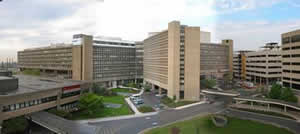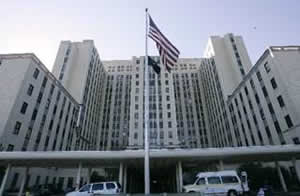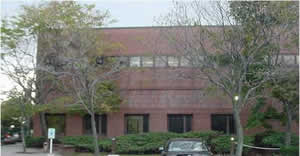Training Sites

University Hospital
University Hospital is the principal teaching hospital of New Jersey Medical School. It is a level 1 trauma center which also serves as the center of referral for many of the state’s advanced medical services and specialty care programs.
The current hospital was built in 1979 and is the home to multiple diagnostic services. Our laboratories in the Division of Anatomic Pathology serve our diverse patient population and are guided by faculty with expertise in surgical pathology (and its subspecialties), cytopathology, neuropathology, dermatopathology, pediatric pathology, and autopsy pathology. Our laboratories in the Division of Clinical Pathology are guided with faculty with expertise in hematology, clinical chemistry and informatics, transfusion medicine, microbiology, and molecular pathology. In addition, the Newark campus houses a cancer treatment center and an ambulatory care center.
The hospital is staffed by 536 members of the medical staff, most of whom are also faculty members of Rutgers New Jersey Medical School. There are also approximately 600 residents. There are approximately 17,000 admissions, 1,600 births, 90, 000 emergency room visits, and 160,000 outpatient visits yearly. As the principal teaching hospital for New Jersey Medical School, Rutgers School of Dental Medicine, and several other Rutgers professional schools, University Hospital provides an unparalleled educational opportunity for numerous students and residents.
For more information, please visit the University Hospital website at http://www.uhnj.org

Department of Veterans Affairs NJ Health Care System (VANJHCS)
The VANJHCS is a consolidated facility which delivers care at two main hospital campuses (East Orange and Lyons) and 17 outpatient facilities that serve the nearly 500,000 veterans living in our state. The VA offers a full range of services including medical, surgical, psychiatric, and nursing home care. There are also award winning programs and initiatives including Prosthetics, Pulmonary Rehabilitation, Diabetes Education, and Homeless Veteran Outreach. There is also an extensive geriatrics care component as nearly half of the veterans are classified as elderly.
In addition, there is an extensive research effort at the VANJHCS with nearly 300 projects in progress and an allocation of $2.5 million. The East Orange VA was selected as one of the government sites for a Center for the Study of War-Related Illnesses.
The VANJHCS has a full electronic medical record, the Computerized Patient Record System (CPRS) which allows search of patient data not only for the New Jersey Health Care System, but to VA facilities all over the United States. This system provides unlimited access to comprehensive patient information, standardizing care for all patients. This system has allowed the VA Health Care System to be at the forefront of medical informatics.
The Department of Pathology at the VA provides care in both anatomic and clinical pathology. Residents are given the opportunity to rotate through the surgical pathology, autopsy, cytopathology, and transfusion medicine services. These rotations give the residents the opportunity to experience the practice of pathology in this unique setting.
At the VANJHCS, There are approximately 4,600 admissions and 591,000 outpatient visits at the hospital and satellite clinics yearly.
For more information, please visit the VANJHCS website at http://www.newjersey.va.gov/

Northern Regional Medical Examiner Office
The Northern Regional Medical Center, located one block from Rutgers New Jersey Medical School, is supervised by the New Jersey Office of the State Medical Examiner which is established within the Division of Criminal Justice of the Office of the Attorney General/Department of Law & Public Safety and is under the immediate supervision of a State Medical Examiner who directly supervises both the Northern and Southern Regional Medical Examiner Offices. The Northern Regional Medical Examiner Office provides medicolegal death investigation services to Essex, Passaic, Hudson, and Somerset Counties.
In the state of New Jersey, a medicolegal death investigation, by law, must be conducted by a duly certified medical examiner in all cases of human death that occur under circumstances that invoke public interest for the purpose of public health, public safety, and the administration of justice. Such cases include all violent deaths whether by accident, suicide, or homicide, deaths under suspicious or unusual circumstances, deaths by inmates of state or county institutions, deaths of children and infants under three years old, and deaths which are thought to possibly constitute a threat to public health.
The Northern Regional Medical Examiner Office is also home to the state toxicology laboratory. Residents are therefore able to explore all facets of a medicolegal death examination as well as learn important techniques such as chain of custody of evidence and testing of specimens from a toxicology perspective. Some of the medical examiners hold clinical faculty appointments through Rutgers New Jersey Medical School.
For more information, please visit the New Jersey Office of the State Medical Examiner at http://www.me.nj.gov/about.html

